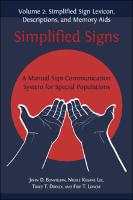Simplified Signs
A Manual Sign-Communication System for Special Populations, Volume 2.
| dc.contributor.author | Bonvillian, John | |
| dc.contributor.author | Kissane Lee, Nicole | |
| dc.contributor.author | Dooley, Tracy T. | |
| dc.contributor.author | Loncke, Filip T. | |
| dc.date.accessioned | 2020-08-12T08:39:27Z | |
| dc.date.available | 2020-08-12T08:39:27Z | |
| dc.date.issued | 2020 | |
| dc.identifier | OCN: 1229812282 | |
| dc.identifier.isbn | 9781783749997 | en_US |
| dc.identifier.isbn | 9781800640009 | en_US |
| dc.identifier.isbn | 9781800640023 | en_US |
| dc.identifier.isbn | 9781800640030 | en_US |
| dc.identifier.isbn | 9781800640047 | en_US |
| dc.identifier.uri | https://library.oapen.org/handle/20.500.12657/41250 | |
| dc.description.abstract | Simplified Signs presents a system of manual sign communication intended for special populations who have had limited success mastering spoken or full sign languages. It is the culmination of over twenty years of research and development by the authors. The Simplified Sign System has been developed and tested for ease of sign comprehension, memorization, and formation by limiting the complexity of the motor skills required to form each sign, and by ensuring that each sign visually resembles the meaning it conveys.Volume 1 outlines the research underpinning and informing the project, and places the Simplified Sign System in a wider context of sign usage, historically and by different populations. Volume 2 presents the lexicon of signs, totalling approximately 1000 signs, each with a clear illustration and a written description of how the sign is formed, as well as a memory aid that connects the sign visually to the meaning that it conveys. While the Simplified Sign System originally was developed to meet the needs of persons with intellectual disabilities, cerebral palsy, autism, or aphasia, it may also assist the communication needs of a wider audience – such as healthcare professionals, aid workers, military personnel , travellers or parents, and children who have not yet mastered spoken language. The system also has been shown to enhance learning for individuals studying a foreign language. Lucid and comprehensive, this work constitutes a valuable resource that will enhance the communicative interactions of many different people, and will be of great interest to researchers and educators alike. | |
| dc.language | English | en_US |
| dc.subject.classification | thema EDItEUR::C Language and Linguistics | en_US |
| dc.subject.classification | thema EDItEUR::C Language and Linguistics::CB Language: reference and general | en_US |
| dc.subject.classification | thema EDItEUR::C Language and Linguistics::CF Linguistics::CFZ Sign languages, Braille and other linguistic communication | en_US |
| dc.subject.other | manual sign communication | en_US |
| dc.subject.other | mastering spoken languages | en_US |
| dc.subject.other | mastering full sign languages | en_US |
| dc.subject.other | intellectual disabilities | en_US |
| dc.subject.other | cerebral palsy | en_US |
| dc.subject.other | autism | en_US |
| dc.subject.other | aphasia | en_US |
| dc.title | Simplified Signs | en_US |
| dc.title.alternative | A Manual Sign-Communication System for Special Populations, Volume 2. | en_US |
| dc.type | book | |
| dcterms.abstract | Simplified Signs presents a system of manual sign communication intended for special populations who have had limited success mastering spoken or full sign languages. It is the culmination of over twenty years of research and development by the authors. The Simplified Sign System has been developed and tested for ease of sign comprehension, memorization, and formation by limiting the complexity of the motor skills required to form each sign, and by ensuring that each sign visually resembles the meaning it conveys.Volume 1 outlines the research underpinning and informing the project, and places the Simplified Sign System in a wider context of sign usage, historically and by different populations. Volume 2 presents the lexicon of signs, totalling approximately 1000 signs, each with a clear illustration and a written description of how the sign is formed, as well as a memory aid that connects the sign visually to the meaning that it conveys. While the Simplified Sign System originally was developed to meet the needs of persons with intellectual disabilities, cerebral palsy, autism, or aphasia, it may also assist the communication needs of a wider audience – such as healthcare professionals, aid workers, military personnel , travellers or parents, and children who have not yet mastered spoken language. The system also has been shown to enhance learning for individuals studying a foreign language. Lucid and comprehensive, this work constitutes a valuable resource that will enhance the communicative interactions of many different people, and will be of great interest to researchers and educators alike. | |
| oapen.identifier.doi | 10.11647/OBP.0220 | en_US |
| oapen.relation.isPublishedBy | 23117811-c361-47b4-8b76-2c9b160c9a8b | en_US |
| oapen.collection | ScholarLed | en_US |
| oapen.pages | 1136 | en_US |

